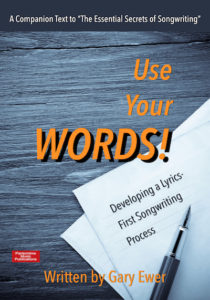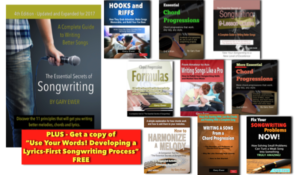There’s probably nothing worse to you as a songwriter than discovering that people are bored with your songs. If you’re like most, you’d rather have a split between people loving and people hating your music. But boring your audience? That’s pretty bad.
Your fans will likely be unmotivated to say why your songs are boring them, but even if you asked someone, they’re usually unable to say why. To them, a boring song just fails to excite them on any level. And a fan who’s bored is likely to simply move on.
 Are you ready to have LYRICS take a much more important role in your songwriting process. You need to read “Use Your Words! Developing a Lyrics-First Songwriting Process.” Right now, it’s FREE with your purchase of “The Essential Secrets of Songwriting 10-eBook Bundle”
Are you ready to have LYRICS take a much more important role in your songwriting process. You need to read “Use Your Words! Developing a Lyrics-First Songwriting Process.” Right now, it’s FREE with your purchase of “The Essential Secrets of Songwriting 10-eBook Bundle”
But as a songwriter, you need to know why your songs are failing to excite listeners.
Usually, the fix for a boring song isn’t particularly complicated. What’s complicated is discovering the cause. Here’s a short list of various song elements, with suggestions for how to fix them when they’re boring.
 Boring Lyrics
Boring Lyrics
There are three main reasons lyrics can be boring:
- The song is about something that just doesn’t connect with listeners.
- You’re using too many cliché lines, making the lyric too predictable.
- The lyrics lack a point of focus; it’s hard to know what the song is really about.
You need to choose a topic that relates to other people’s life experience – something they can relate to. Make them feel that your story is also their story.
In relating that story, clichés are going to kill the narrative. A cliché sounds lazy. They can be more successfully used in a chorus, but in a verse, they can make your story sound mundane.
The solution to boring lyrics is to make sure that, first and foremost, the lines of lyric have a point of focus. I’ve written before about logical followers, where each line of lyric is the logical follower of the line that precedes it.
If you want to read more about this, as well as other typical lyric problems, please read my article “Fixing Common Problems With Song Lyrics” – I think you’ll find it helpful.
Boring Melodies
It’s hard to say why a melody might be boring. You could say that if it always sits around the same note, or doesn’t use many pitches, that that’s a recipe for boredom. But there are many songs that use a very small tone set (Tom Petty’s “Free Fallin'” comes to mind), and yet despite the use of very few notes, the songs feel successful.
 Boring melodies happen usually in conjunction with other song elements. In other words, a melody that sits around one or two notes, where the chords and lyrics are also uneventful, can result in a tune that sounds powerfully mundane!
Boring melodies happen usually in conjunction with other song elements. In other words, a melody that sits around one or two notes, where the chords and lyrics are also uneventful, can result in a tune that sounds powerfully mundane!
So how do you know if it’s the melody itself that is the cause of listener boredom? Sometimes the best way to analyze a problem with the melody is to put a magnifying glass on the other elements. If you find that you’ve got a chord progression that you like, and the lyrics sound acceptable, a melody may need to move up and down a bit more than what you’re allowing.
If you really think that the melody is at fault, look for ways to inject an upward melodic leap, or a climactic high point. A melody usually only needs one exciting spot, usually more toward the end than the beginning of a song section, that injects a bit of melodic energy. It doesn’t take much.
There are several songs that seem to be great examples of songwriting, and I find myself often returning to Michael Jackson’s “Billie Jean” as a great model for solid songwriting technique. In this case, it’s a great example of what a good song melody should do. Sing through the chorus, and make note of the more exciting highs that happen on the line:
who claims that I am the one
But the kid is not my son
So it’s often the case that a boring melody will be fixed by inserting a high point near its end, or by injecting a melodic leap somewhere, a leap designed to grab listener attention.
Boring Song Form
 One of the most common problems in songwriting is the issue of song length. More often than not, a boring song is simply too long. I’ve almost never heard a song that I thought was too short. But I’ve heard many that I thought were too long.
One of the most common problems in songwriting is the issue of song length. More often than not, a boring song is simply too long. I’ve almost never heard a song that I thought was too short. But I’ve heard many that I thought were too long.
This relates to song form, of course. Songs with four or five verses are tricky. In the pop genres, that’s getting dangerously long, and not everyone is a Bob Dylan, who can successfully entice audiences with so many verses of “Like a Rolling Stone.”
So the solution is usually to find a way to express what needs to be expressed in two verses, or three at the most. Songs beyond 5’00” need to have a good reason for being that long. At 5’00”, you’re getting into dangerous territory for creating musical boredom.
Boring or Bad Production/Musical Arrangement
A song needs to be well-played and well-produced in order to avoid listener boredom. It’s not usually a songwriting issue, but more good songs have been killed by bad production than you might imagine.
 It’s worth the time and money, if you have it, to involve a producer who knows what they’re doing, who’s got experience, and who understands your genre. They know what to do with your song to make it exciting to an audience.
It’s worth the time and money, if you have it, to involve a producer who knows what they’re doing, who’s got experience, and who understands your genre. They know what to do with your song to make it exciting to an audience.
A good producer is usually objective enough to know how to present your song for its best and fullest effect. They’re not in love with your song like you are, and that’s usually to your advantage. These things cost money, of course, so you need to decide what it’s worth to you.
If you feel that you’re trying to make a move into the professional songwriting world, finding a producer who believes that you’ve got what it takes can be one of the most important things you do to advance your career.
Objective Listening
Here’s something I suggest to anyone trying to get a handle on this important issue: Record your song, then put a song away for a couple of weeks. Once you’ve “cleansed it from your system”, return to it, and listen as objectively as you can. How does it sound? What do you like? What do you find boring?
The time away from your song makes it easier to hear boring elements for what they are. And you’ll have a clearer view of what you need to do to solve the problem.
To develop your skills at objective listening, read this article: “Good Songwriting and Objective Listening”
 Written by Gary Ewer. Follow Gary on Twitter.
Written by Gary Ewer. Follow Gary on Twitter.
 “The Essential Secrets of Songwriting” 10- eBook bundle comes with a free copy of “Use Your Words! Developing a Lyrics-First Songwriting Process.” Discover the power and excitement that comes from putting your lyrics front and centre in the songwriting process.
“The Essential Secrets of Songwriting” 10- eBook bundle comes with a free copy of “Use Your Words! Developing a Lyrics-First Songwriting Process.” Discover the power and excitement that comes from putting your lyrics front and centre in the songwriting process.










